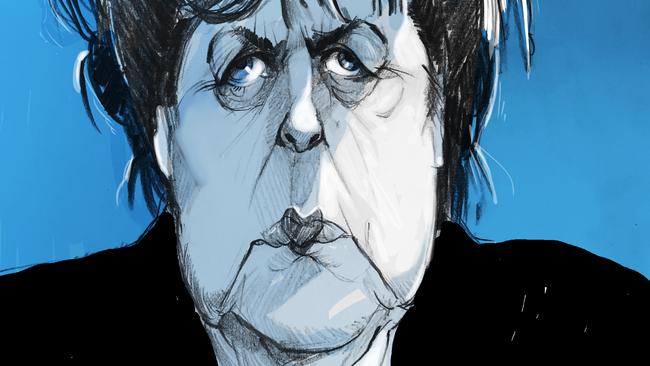
Europe was once the exemplar of the good society when seen through the dreamy eyes of Australian sophisticates.
Now, like the images of disease and deformity on cigarette packets, Europe serves as a graphic warning. We must quit our addiction to social engineering before it’s too late.
The European financial crisis of 2008 demonstrated the limits to government spending. This year’s chaos at the borders shows the limits of mass migration. Europe has been eroded of social as well as financial capital.
Anxiety surfaces in many different ways. In Sweden, a woman emailed her prime minister to tell him she had moved out from the suburb in which she was born because it was impossible to walk her dogs “due to the non-Europeans driving on the sidewalks”.
“If you didn’t move out of the way, they would jump out of the car and hit you,” she complained.
In Pocking in Lower Bavaria, the local school recently advised children to wear “restrained everyday clothes” after 200 male asylum-seekers were billeted in the German village. “Transparent tops or blouses, short shorts or miniskirts could lead to misunderstandings,” it said.
A local politician told Die Welt advice of this kind was “absolutely necessary”.
“If underage Muslim boys go to the swimming pool, they are completely overwhelmed to see girls in bikinis,” he told the newspaper. “In the boy’s culture, the bare skin of women is totally frowned upon. They run after the girls harassing them, without intending to, but of course it triggers fears.”
In developed Western societies the social fabric is being stretched to the limit by the audacious post-war diversity project. The ease of modern travel and the UN’s outdated refugee charter have supercharged this social experiment.
The utopian dreamers who see virtue in diversity seem oblivious to the damage they have done. If only we were nicer to our guests, they insist, then everything would be fine.
The severity of the social fracturing is seldom reflected in the mainstream media. Well-intended journalists and editors are uncomfortable about giving oxygen to the ugly side of multiculturalism. Strict social sanctions have been imposed on anybody breaking the code of niceness.
Now, thanks in part to the internet, the thought police are losing control. On social media, ordinary citizens share information — some of it correct, some little more than rumour — in a space where they no longer feel ashamed to speak their minds.
It is there, and almost nowhere else, that you will read about the 16-year-old girl who was raped last month in Mering in Bavaria by a suspect with brown skin speaking in broken German. Such a crime was unheard of until now in the quiet market town. Understandably, the finger of suspicion points to a nearby camp for mostly male asylum-seekers.
The internet also reveals that the proportion of crimes committed by asylum-seekers in Germany has doubled in three years from 3.3 per cent to 7.7 per cent. There has been a sharp rise in personal injury, from 3863 to 9655. Shoplifting cases have risen from 4974 to 13,894. Reports of this nature, buried in the back pages of the German-language press, are amplified by social media. Some may call it fearmongering; others may say it gives people the confidence to say what they actually think.
Scarily, Germany’s Angela Merkel has responded by preparing to send the thought police into Facebook. “Are you working on this?” she was overheard asking Facebook chief executive Mark Zuckerberg last month. “Yeah,” replied Zuckerberg.
The idea that private thoughts could be expunged on the orders of a German chancellor is too horrible to contemplate. Yet Merkel nurses the delusion that a quick word with Zuckerberg will silence discontent.
Merkel has become a deeply polarising figure, splitting Europeans into opposite camps. There are those who think she deserves the Nobel Peace Prize and those who think she has completely lost the plot.
Where on earth did she think 800,000 migrants (a figure that could blow out to 1.5 million, according to some estimates) might live? There’s a chronic housing shortage in German cities in the west where the jobs are, but a glut of accommodation in the country and the east.
A 2010 study by the Institute for the German Economy found the unemployment rate for those without a German passport is 14 per cent. Among those from Islamic countries it was even higher: 55 per cent for Lebanese migrants, 46 per cent for Iraqis and 28 per cent for Afghans.
Elsewhere in Europe, the picture is much the same; asylum-seekers are far likelier to live off welfare than locals or migrants who arrive by other means.
The same picture — mercifully on a smaller scale — is emerging in Australia.
A study of 8500 entrants under the humanitarian resettlement program conducted by the Gillard government in 2011 found that more than six out of 10 refugees had failed to get a job after five years. Eighty-three per cent received Centrelink payments. As in Europe, those from Islamic countries fared worse. Fewer than one in 10 Iraqi and Afghan refugees had found work; 94 in every 100 were receiving welfare.
At a time when the federal government is devoting considerable resources to helping people escape the welfare trap, a new cohort of hand-out dependency is an alarming development.
Hard data on how asylum-seekers fare is difficult to come by, not least one suspects because of the squeamishness of those who compile the statistics.
Economically inactive migrants are a new phenomena in Australia, one that the present asylum system appears to foster.
Until now this has never been a country that merely offered shelter; it offered the chance to build a better life. Without work, the chances of that are vanishingly small.
Nick Cater is executive director of the Menzies Research Centre


